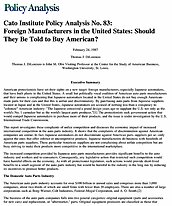This report investigates these complaints of unfair competition and discusses the economic impact of increased international competition in the auto parts industry. It shows that the complaints of discrimination against American companies are untrue. In fact, Japanese automakers do not discriminate against American parts suppliers per se–only against the ones that offer inferior or uncompetitive products. Japanese manufacturers do business with hundreds of American parts suppliers. These particular American suppliers are not complaining about unfair competition but are busy striving to make their products more competitive in the international marketplace.
The increased competition provided by Japanese auto parts manufacturers provides significant benefits to the auto industry and workers and to consumers. Consequently, any legislative action that restricted such competition would have harmful effects on the economy. As with all protectionist legislation, such actions would provide short-lived benefits to a small segment of the auto parts industry but would be harmful to the industry in the long run by reducing its incentives to produce better products.

